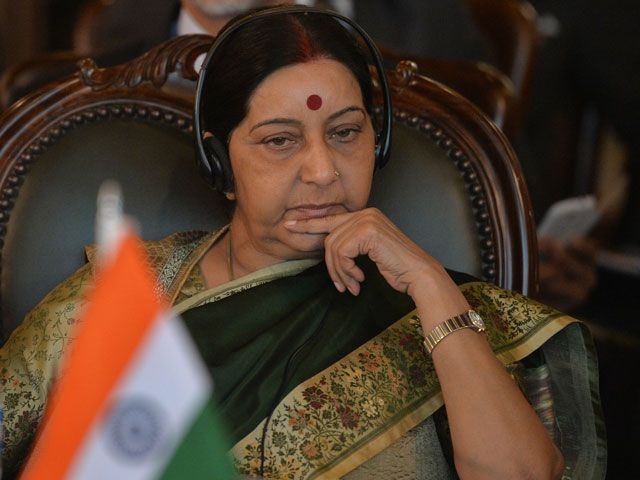Sushma pitches for uninterrupted talks
Indian FM says Delhi would like not to be provoked by saboteurs

Indian Foreign Minister Sushma Swaraj attends the first day of the Heart of Asia conference in Islamabad on December 9, 2015. PHOTO: AFP
A week after Islamabad and New Delhi decided to re-engage to resolve the issues bedeviling their bilateral relations, India’s Minister for External Affairs Sushma Swaraj said Premier Narendra Modi’s administration intended to have an ‘uninterrupted’ dialogue process with Pakistan despite provocations from ‘saboteurs’.
Sushma visited Islamabad on December 8 and 9 for a ministerial meeting of the Heart of Asia-Istanbul Process.
Sushma Swaraj briefs Indian lawmakers on Pakistan visit
On the sidelines, she met with her Pakistani counterpart Sartaj Aziz where the two sides decided to revive a stalled dialogue process and rebrand it as ‘Comprehensive Bilateral Dialogue’.
Briefing Indian Parliament on her Pakistan trip, Swaraj dismissed accusations that India’s Pakistan policy was full of flip-flops, and justified the decision to have Comprehensive Bilateral Dialogue saying “there is a need for bridging the gulf” with the neighbouring country for peace and stability in the region.
Swaraj, who read out her statement in Rajya Sabha, upper house of Indian parliament, amid a din created by Congress members over an incident in Punjab, said: “The new dialogue, we sincerely hope, marks a new beginning also for peace and development in the whole region.”
She said, “The underlying sentiment [of initiating dialogue] ... was that the continued estrangement of two neighbours was a hurdle to the realisation of our shared vision of a peaceful and prosperous region.”

At the same time, there was also a ‘sharp awareness’ that principal obstacles to the growth of ties, especially terrorism, would have to be clearly and directly addressed.
India, Pakistan agree to resume comprehensive dialogue
The Comprehensive Bilateral Dialogue with Pakistan will begin with the objective of “removing hurdles in the path of a constructive engagement by addressing issues of concern,” she added.
The new dialogue aims at “exploring and establishing cooperative ties,” she said, adding that initiatives on trade and connectivity, people-to-people exchanges and humanitarian issues would contribute to welfare of the entire region, and promote better understanding and mutual trust. Answering critics, she said in the latest arrangement, the level of talks on terror has been raised as this issue will now be dealt with by the national security advisers (NSAs) instead of the foreign secretaries as earlier.
The fact that the NSAs of India and Pakistan met in Bangkok without any publicity does not mean any third country’s involvement but it was only to take forward the Ufa process as such a meeting could not take place in Delhi as ‘you all know’, she told the Lok Sabha.
The prime ministers of the two countries had met in July on the margins of the Shanghai Cooperation Organisation in the Russian city of Ufa where they decided that their NSAs would meet in Delhi a month later to discuss the possibility of reviving the moribund dialogue process. However, the meeting was called off at the eleventh hour after India insisted that the NSAs would only discuss terrorism-related issues.
Sushma appreciated the fact that the house had welcomed the initiative after 13 members from various parties spoke.
India's foreign minister to visit Pakistan for first time since 2012
“Nothing has changed on the ground. Because we had said that terror and talks cannot go together. So at Ufa, we said the NSAs will talk on terrorism,” she said to a question about what had changed since August when the NSA-level talks could not take place after Pakistan insisted that Kashmir should also be discussed at the meet.
“Whenever talks happen, that is based on trust....There is a need to bridge the gulf [with Pakistan],” Swaraj said, adding progress in dialogue is necessary for peace.
Underlining that “the only way forward is through dialogue”, she said Prime Minister Modi had initiated efforts to reach out to Pakistan not in Ufa but even before he took oath on May 26 last year when he invited his Pakistani counterpart to his swearing-in ceremony.
To demands by some members for assurance that the dialogue process will be ‘uninterruptable’, Sushma said, “It never works like that. We would like not to get provoked by saboteurs who want to stall the dialogue somehow, and will try and find a way forward through dialogue. This will be our intent.”
When some members alleged ‘flip flop’, she said it was not the ‘correct definition’ as stopping and restarting a dialogue process is a ‘part of diplomacy’. “Starting talks, stopping and then again starting does not mean flip flop... It is not the correct definition. It is a part of diplomacy that talks happen, then stop and then happen again.”
Published in The Express Tribune, December 15th, 2015.



















COMMENTS
Comments are moderated and generally will be posted if they are on-topic and not abusive.
For more information, please see our Comments FAQ